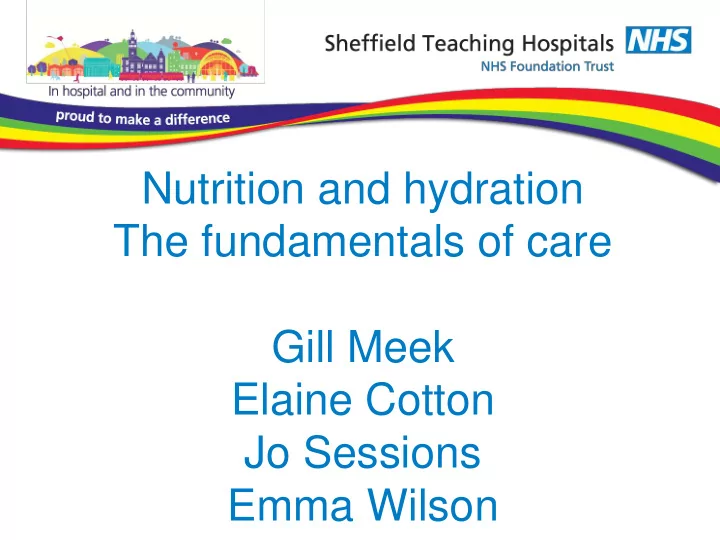

Nutrition and hydration The fundamentals of care Gill Meek Elaine Cotton Jo Sessions Emma Wilson
Background • Malnutrition costs the NHS £13 billion annually • Food and drink are essential for recovery • Nutrition & hydration cited in patient complaints
Nutrition & Hydration Infrastructure at STH Healthcare Governance Patients Nurse Executive Committee Group Governors Housekeepers Domestic staff STH Nutrition Dietetic Staff Steering Group Nursing Staff Food Management Group Speech & Catering Medical Language OT Staff Pharmacy staff Staff Staff Staff Nutrition Champions
STH Nutrition Steering Group • Set up in 2006 in response to NICE guidance • Provides strategic direction, leadership, and approval upon specific issues relating to nutrition and hydration for patients. • A multidisciplinary approach -Members of the nutrition steering group have specific expertise in different aspects of nutrition and provide an advisory role to staff in the Trust.
Christina Wong Consultant Pharmacist Mark McAlindon Irene Mabbott Consultant Gastroenterology Professional and Practice Development Manager Jane Hesketh Elaine Cotton Community Head of Dietetics Dietetics Nutrition Steering Group Ann Eckford Patient Governor Gill Meek Nurse Director: Surgical Emma Wilson Jo Sessions Head of Catering Specialist Practitioner Sue Pownall Speech & Language Therapy
NICE QS24 The quality standard for nutrition support in adults requires that all care services take responsibility for the identification of people at risk of malnutrition and provide nutrition support for everyone who needs it. An integrated approach to the provision of services is fundamental to the delivery of high-quality care to adults who need nutrition support. It is particularly important that nutrition support services are multidisciplinary and overseen and led by senior level staff from across settings, for example through nutrition steering groups or committees.
Health and Social Act 2008 (Regulated Activities) Regulations 2014 (Regulation 14) Every provider organisation is required to make sure the individuals in care have enough to eat and drink to meet their nutrition and hydration needs and receive the support they need to do so. Individuals “must have their nutritional needs assessed and food must be provided to meet those needs. This includes where people are prescribed nutritional supplements and/or parenteral nutrition” (Source: CQC website)
Nutrition Champions • Motivated keyworkers in nutrition and hydration practices at STH • Developing the role - increasing numbers across STH • From a variety of staff groups – utilising the knowledge & enthusiasm
HANAT • HANAT is “Hydration And Nutrition Assurance Toolkit” • A toolkit to assist ward staff - covering all aspects of nutrition and hydration • Key point – ownership by the clinical areas • A snapshot, with audit data about how that area is doing • Mandatory for all STH inpatient areas • Launched – End of 2014
How is HANAT doing ? • Since the start of 2015: – Currently 46/68 wards working with HANAT – Increased numbers of Nutrition Champions – 65 new champions in 2015 – Staff training and support continues – Raised awareness – staff happier to evaluate own practices – Improvements in MUST compliance – Multidisciplinary working, attendance at food tastings, food managements meetings improving all the time
Sharing Good Practice • Emphasis within HANAT = good practice is shared • Often the simple changes are most effective – Bendable cutlery - Chalk board – Red lid system - MUST teaching • Results of the audits and action plans from each area about their results forthcoming
Food Management • Quarterly meetings • Tastings • Tours
Eating For Health • Ward Meal Service Protocol • Working with Wards • Food Choices • Soil Association • Fresh Food • Sustainably Sourced • Food and Drink Strategy
Nutrition and Hydration Awareness Week • An annual event • Linking in with the national & international movement • Showcasing good practices around STH
Conclusion • Nutrition and Hydration is important to staff at STH as well as patients • HANAT, as part of a multifaceted approach is working for STH • Wards are already changing practice to engage in HANAT • Ownership and the whole team pulling together on Nutrition and Hydration practices
Any questions?
Recommend
More recommend